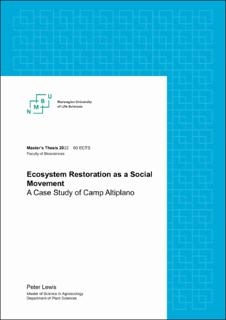Ecosystem restoration as a social movement : a case study of Camp Altiplano
Master thesis
Submitted version
Permanent lenke
https://hdl.handle.net/11250/3002528Utgivelsesdato
2022Metadata
Vis full innførselSamlinger
- Master's theses (IPV) [240]
Sammendrag
Ecosystem restoration as a social movement is a promising approach to restoration that addresses flaws and gaps in the dominant institutional approach to restoration. By drawing on the framing approach to social movement analysis, this thesis employs a case study to examine the beliefs that motivate people to participate in ecosystem restoration, asking how participants define the problems that need to be addressed, the solutions to be enacted, and their rationales for acting. Data was collected using participant observation and semi-structured interviews and assessed qualitatively using conventional and directed content analysis. Key findings highlight 1) a tension between the relative importance of supporting restoration versus opposing systems enabling ecosystem destruction, 2) a willingness to engage in restoration work regardless of the outcome, 3) and a deep affinity between agroecology and the restoration movement. The resonance between restoration and agroecology is expressed through participants’ focus on values and social organization as key problems and potential solutions, their support for a transition to an agroecological epistemology, and their call for food systems transformation. Future studies should engage with a wider cross-section of the restoration movement and explore the potential of different frames to mobilize support and resources for restoration.

